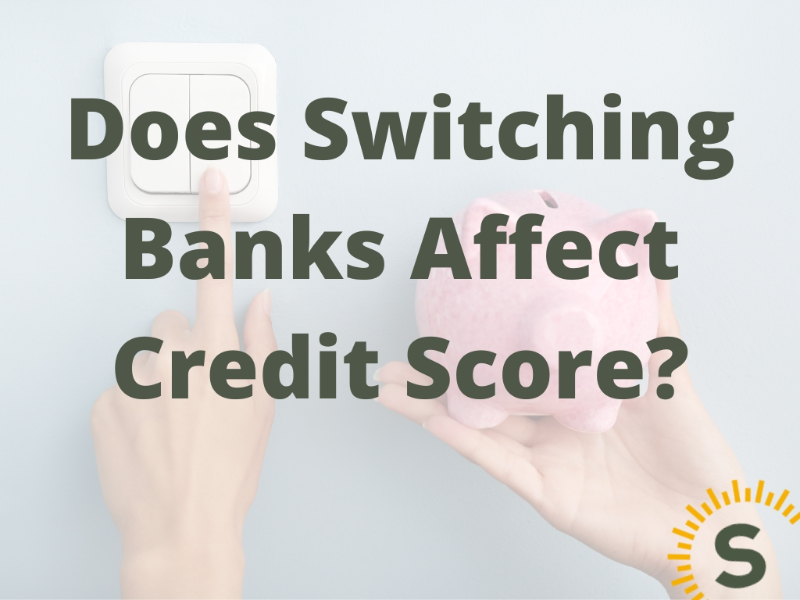
Are you considering switching banks, but worried about the potential impact it could have on your credit score? The common question, "Does switching banks affect credit score?" often plagues customers who are unsatisfied with their current banking service and are considering a change.
This insight will consider whether changing banks can actually influence your credit score, and if so, how it does so.
Switching banks can have a temporary impact on your credit score. When you apply to open a new account, the bank may perform a credit inquiry, resulting in a small, temporary dip in your credit score.
Your credit score is a numerical representation of your creditworthiness, based on a detailed analysis of your credit files. It's a critical factor that lenders consider when you apply for loans, credit cards, or even certain types of bank accounts. Understanding the intricacies of your credit score and how different actions can impact it is crucial to maintaining healthy financial habits.
Bank switching involves closing an existing bank account and opening a new one with a different bank. This process is often incentivised by banks through attractive offers like cash bonuses, higher interest rates, or better customer service. While switching banks can potentially bring you savings and make it easier to manage your money, it's important to understand its potential impact on your credit report.
When you apply to open a new bank account, it's standard practice for the bank to conduct a credit check. This can be either a 'soft check' or a 'hard check'. A soft check is a preliminary credit inquiry that verifies your identity and doesn't appear on your credit report. On the other hand, a hard check is a full-fledged credit inquiry that does show up on your credit report and can potentially impact your credit score.
While the bank switching process itself does not inherently damage your credit score, certain aspects associated with it can. Let's delve into these potential pitfalls:
If you apply for multiple bank accounts within a short period, each application could result in a hard check. Every hard check can cause a slight dip in your credit score. If lenders see multiple hard checks on your report within a short time, they may view this as a sign of financial desperation, which could make obtaining credit more difficult in the future.
An overdraft is essentially a pre-approved loan with a high-interest rate. Applying for one as part of your bank account application can lower your credit score, even if you don't intend to use it. It shows future lenders that you already have access to credit, which might deter them from lending you more.
Opening a joint account links your credit files with the other account holder. If the other person has a poor credit score, it could negatively impact your credit rating and vice versa.
Having a long-term financial relationship with a bank can be a positive signal for your credit score. Hence, switching from an older bank account replaces a potentially long history with an account that has no history, which might result in a minor negative impact on your credit score.
While your credit score is an important aspect of your financial profile, it isn't the only thing that banks consider. Banks also look at the details of your credit report, their own data on you (if you're an existing or past customer), and additional information you provide during the application process. Therefore, even if your credit score takes a slight hit after a bank switch, this doesn't necessarily mean you'll be turned down for future credit applications.
If you're planning to apply for a major form of credit in the next six months, such as a mortgage or a substantial loan, it's advisable to avoid opening a new bank account and switching during that time.
The more frequently you switch banks, particularly within a short period, the larger the potential drop in your credit score. This could make short-term credit applications more challenging. However, if you've been switching banks for a while, you might only be eligible for new switch deals once or twice a year, which reduces the potential impact on your credit score.
Some banks only conduct soft checks when you apply for a new account, making it less likely that your credit score will be affected. These include digital banks like Starling Bank and Monzo Bank. If you're concerned about hard checks, consider opening an account with these banks.
While it's important to be aware of the potential impact on your credit score, don't let this deter you from considering a bank switch if you're unsatisfied with your current banking service. The key is to be mindful of your credit score, understand the potential impacts, and make informed decisions that benefit your financial health in the long run.
If you've already switched your bank account, the only way to check the impact on your credit score is to get hold of your credit report and check the impact of the searches.
To obtain your multi-agency credit report from Checkmyfile, you can take advantage of their 30-day free trial. During this trial period, you can explore your credit information from all four major credit reference agencies without incurring any charges.
After the trial period, Checkmyfile charges a monthly fee of £14.99. However, you have the flexibility to cancel your account at any time if you choose not to continue using their services beyond the free trial.
So, does switching banks affect credit score? In summary, while switching banks can have some impact on your credit score, it's not necessarily a negative one. It all depends on your individual financial situation and the steps you take during the switching process. By being aware of these factors and planning accordingly, you can make bank switching a positive step in your financial journey.
Find out how you can check your credit score for free here

Stuart is an expert in Property, Money, Banking & Finance, having worked in retail and investment banking for 10+ years before founding Sunny Avenue. Stuart has spent his career studying finance. He holds qualifications in financial studies, mortgage advice & practice, banking operations, dealing & financial markets, derivatives, securities & investments.





Our website offers information about financial products such as investing, savings, equity release, mortgages, and insurance. None of the information on Sunny Avenue constitutes personal advice. Sunny Avenue does not offer any of these services directly and we only act as a directory service to connect you to the experts. If you require further information to proceed you will need to request advice, for example from the financial advisers listed. If you decide to invest, read the important investment notes provided first, decide how to proceed on your own basis, and remember that investments can go up and down in value, so you could get back less than you put in.
Think carefully before securing debts against your home. A mortgage is a loan secured on your home, which you could lose if you do not keep up your mortgage payments. Check that any mortgage will meet your needs if you want to move or sell your home or you want your family to inherit it. If you are in any doubt, seek independent advice.